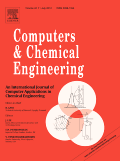
COMPUTERS & CHEMICAL ENGINEERING
Scope & Guideline
Integrating Algorithms and Engineering for a Sustainable Future
Introduction
Aims and Scopes
- Computational Modeling and Simulation:
The journal emphasizes the development and application of computational models for simulating chemical processes, including dynamic simulations, process optimization, and system identification. - Data-Driven Approaches:
A significant focus is on employing data-driven methodologies such as machine learning, artificial intelligence, and statistical methods for process optimization, fault detection, and predictive modeling. - Process Optimization:
The journal covers various optimization techniques, including mixed-integer linear programming (MILP), dynamic optimization, and robust optimization, aimed at improving the efficiency and sustainability of chemical processes. - Integration of Environmental and Economic Factors:
Research published in the journal often explores the techno-economic and environmental assessments of chemical processes, ensuring that sustainability is a core consideration in process design and operation. - Innovations in Process Control:
The journal highlights advancements in control strategies, including model predictive control (MPC), reinforcement learning-based control, and adaptive control strategies tailored for complex chemical processes. - Chemical Engineering Education:
The journal also addresses the educational aspects of chemical engineering, focusing on innovative teaching methodologies and the integration of computational tools into the curriculum.
Trending and Emerging
- Machine Learning and AI Applications:
Recent publications have increasingly focused on the application of machine learning and artificial intelligence in chemical engineering, particularly for process optimization, fault detection, and predictive maintenance. - Sustainability and Green Engineering:
There is a growing emphasis on sustainability, with research exploring eco-friendly processes, circular economy principles, and the integration of renewable energy in chemical manufacturing. - Advanced Process Control Techniques:
Emerging control strategies such as reinforcement learning-based control and adaptive model predictive control are gaining traction, reflecting the industry's shift towards more intelligent and responsive systems. - Data-Driven Decision Making:
The trend towards data-driven decision-making processes is evident, with research focusing on the use of real-time data analytics and big data approaches for enhancing operational efficiency in chemical processes. - Integration of Quantum Computing:
There is an emerging interest in the application of quantum computing techniques for solving complex optimization problems in chemical engineering, indicating a forward-looking trend in computational capabilities.
Declining or Waning
- Traditional Chemical Process Design:
There is a noticeable decrease in publications focusing solely on conventional chemical process design without the integration of computational tools or data-driven approaches. - Static Optimization Models:
Research centered on static optimization models that do not incorporate real-time data or dynamic elements is becoming less common, as the field moves towards more adaptive and responsive methodologies. - Basic Process Control Strategies:
Basic control strategies that do not leverage advanced computational techniques or adaptive learning methods are seeing reduced interest, as more sophisticated control approaches take precedence. - Single-Disciplinary Approaches:
There is a decline in research that does not integrate interdisciplinary methods, particularly those that do not combine chemical engineering with computer science, data analytics, or environmental science.
Similar Journals
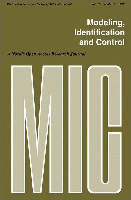
MODELING IDENTIFICATION AND CONTROL
Advancing Knowledge in Control and Systems EngineeringMODELING IDENTIFICATION AND CONTROL is a prominent academic journal dedicated to the fields of Computer Science Applications, Control and Systems Engineering, Modeling and Simulation, and Software. Published by MIC in Norway, this open access journal has been providing valuable insights and innovative research since 1980, promoting the free dissemination of knowledge. With a reputation reflected in its 2023 quartile rankings—Q3 in Computer Science Applications, Q2 in Control and Systems Engineering, and Modeling and Simulation, as well as Q3 in Software—this journal plays a vital role in advancing theoretical and practical solutions within its disciplines. Researchers and professionals benefit from its rigorous peer-review process and impactful publications, fostering collaboration and the exploration of emerging technologies across various applications. The journal's continual commitment to excellence is exemplified by its active presence in Scopus, where it maintains respectable rankings in relevant engineering and computer science subcategories, supporting its goal to be a pivotal resource for scholarly communication and practical advancements.

Modelling
Exploring the Dynamics of Modeling Excellence.Modelling is a distinguished open access journal published by MDPI since 2020, dedicated to advancing the field of computational modeling across various scientific disciplines including Computer Science, Engineering, and Mathematics. With its base in Switzerland, the journal aims to foster a collaborative environment for researchers and practitioners while providing a platform for high-quality research on modeling and simulation techniques. As of 2023, it has garnered respectable rankings, achieving Q3 in Computer Science and Mathematics, and Q2 in Engineering, with notable Scopus values indicating an increasing impact within the academic community. Modelling not only publishes innovative research findings but also encourages the dissemination and discussion of emerging methodologies, making it a vital resource for scholars seeking to contribute to and expand the frontiers of knowledge in their respective fields. As an open access journal, it promotes unrestricted access to research outputs, ensuring greater visibility and impact for researchers and students alike.
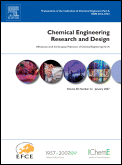
CHEMICAL ENGINEERING RESEARCH & DESIGN
Unveiling New Horizons in Chemical Engineering.CHEMICAL ENGINEERING RESEARCH & DESIGN is a prestigious journal that has been at the forefront of dissemination in the fields of chemical engineering and general chemistry since its inception in 1983. Published by Elsevier, the journal features a rich array of research articles that contribute to both theoretical and practical advancements in the discipline. With an impact factor that positions it strongly within the Q2 quartile for both Chemical Engineering and Chemistry categories, it occupies an esteemed place in the academic community, being ranked #77 out of 273 in Chemical Engineering and #111 out of 408 in General Chemistry on Scopus. Researchers and professionals will find it an invaluable resource for cutting-edge research and innovative methodologies that shape the future of chemical engineering applications. While the journal does not currently offer open access, it remains accessible through institutional subscriptions, ensuring that important findings continue to reach a broad audience. With a scope that is poised to expand through 2024, the journal aims to foster collaboration and knowledge sharing, supporting the continuous evolution of the field.
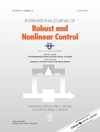
INTERNATIONAL JOURNAL OF ROBUST AND NONLINEAR CONTROL
Transforming Theoretical Insights into Practical ApplicationsINTERNATIONAL JOURNAL OF ROBUST AND NONLINEAR CONTROL, published by Wiley, is a leading journal in the fields of Aerospace Engineering, Biomedical Engineering, Chemical Engineering, Control and Systems Engineering, Electrical and Electronic Engineering, Industrial and Manufacturing Engineering, and Mechanical Engineering. With an impressive range of categories all ranked in the Q1 quartile as of 2023, this journal serves as a pivotal platform for disseminating high-quality research focused on robust and nonlinear control methodologies. Researchers and practitioners benefit from its comprehensive scope, which includes theoretical advances, algorithm development, and practical applications. The journal's commitment to fostering innovation in control systems is reflected in its notable Scopus rankings across various engineering disciplines, ensuring your work reaches a wide audience. Emphasizing the importance of collaboration in interdisciplinary contexts, the INTERNATIONAL JOURNAL OF ROBUST AND NONLINEAR CONTROL is essential for both seasoned researchers and newcomers in the engineering community, providing a vital resource for advancing the frontiers of knowledge in control systems.
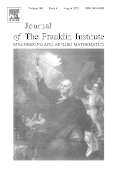
JOURNAL OF THE FRANKLIN INSTITUTE-ENGINEERING AND APPLIED MATHEMATICS
Fostering a legacy of excellence in academic research.JOURNAL OF THE FRANKLIN INSTITUTE-ENGINEERING AND APPLIED MATHEMATICS, published by Pergamon-Elsevier Science Ltd, stands as a premier platform for disseminating cutting-edge research in the fields of applied mathematics, computer networks and communications, control and systems engineering, and signal processing. Established in 1826, this esteemed journal carries a rich heritage of scholarly contributions and continues to be influential, evident in its 2023 recognition as a Q1 journal across multiple research categories. With its commitment to advancing knowledge and innovation, the journal invites researchers, professionals, and students to engage with a diverse array of rigorous studies designed to push the boundaries of engineering and applied mathematics. Although open access options are currently unavailable, the journal maintains a robust publication standard, ensuring that each article undergoes a meticulous peer-review process. By contributing to the JOURNAL OF THE FRANKLIN INSTITUTE, authors can enhance their visibility and impact within the global academic community, solidifying the journal’s role as a cornerstone of research and development.

Chemical Product and Process Modeling
Advancing the art of chemical engineering through innovative modeling.Chemical Product and Process Modeling is a vital academic journal published by WALTER DE GRUYTER GMBH, focusing on the intricate intersection of chemical engineering and mathematical modeling. Since its inception in 2006, this journal has been instrumental in disseminating significant research findings and methodologies that advance the modeling and simulation of chemical products and processes. With an ISSN of 1934-2659, it caters to a global audience from its base in Berlin, Germany. Although positioned within the Q3 and Q4 quartiles in Chemical Engineering and Modeling & Simulation categories respectively in 2023, it offers a platform for innovative approaches and contributions in these fields, making it a resource for researchers and industry experts alike. Access to the journal's content is offered through subscription models, enabling professionals and academics to stay abreast of the latest developments. In a rapidly evolving scientific landscape, Chemical Product and Process Modeling remains dedicated to enhancing knowledge and fostering collaboration within the chemical engineering community.

Bulletin of the South Ural State University Series-Mathematical Modelling Programming & Computer Software
Unlocking New Dimensions in Computational MathematicsThe Bulletin of the South Ural State University Series-Mathematical Modelling Programming & Computer Software is a distinguished academic journal focusing on the interdisciplinary fields of mathematical modeling, programming, and software development. Published by the SOUTH URAL STATE UNIVERSITY, SCIENTIFIC RESEARCH DEPARTMENT, this journal serves as a platform for the dissemination of innovative research findings, methodologies, and applications in computational mathematics and related disciplines. With its ISSN 2071-0216 and E-ISSN 2308-0256, it has garnered attention within the research community, reflected in its rankings within the Q4 quartile across multiple categories in 2023, including Computational Mathematics and Software. Although it operates under an open access model, the journal emphasizes the importance of high-quality, peer-reviewed content to advance research education and practice in the Russian Federation and beyond. Researchers, professionals, and students are encouraged to contribute and access valuable insights, fostering collaboration among disciplines spanning mathematical theory, computational methods, and software development.
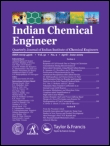
Indian Chemical Engineer
Shaping Tomorrow's Chemical Engineers Today.Indian Chemical Engineer, published by Taylor & Francis Ltd, stands as a reputable journal in the field of chemical engineering, encompassing a wide range of topics pertinent to both academia and industry. With an ISSN of 0019-4506 and an E-ISSN of 0975-007X, this journal has been a key resource for researchers and professionals since its inception in 1992, undergoing a significant evolution from 2009 to 2024. Currently ranked in the Q3 category of chemical engineering (miscellaneous) in 2023, it reflects a dedicated commitment to disseminating innovative research and insights within the discipline. The journal is indexed in Scopus, achieving a rank of 148 out of 273, which denotes its growing influence in the field with a 45th percentile placement. Although currently not an open-access publication, it offers valuable content that contributes extensively to the advancement of chemical engineering research and education. Researchers, professionals, and students alike are encouraged to engage with this publication to stay at the forefront of industry advancements and academic discussions.
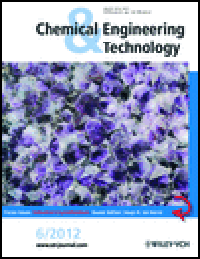
CHEMICAL ENGINEERING & TECHNOLOGY
Pioneering Insights in Chemical Engineering ExcellenceChemical Engineering & Technology is a prestigious journal published by Wiley-VCH Verlag GmbH, focusing on the evolving field of chemical engineering and its related disciplines. With an ISSN of 0930-7516 and E-ISSN of 1521-4125, the journal has established a robust platform for researchers and practitioners to share pioneering studies and innovative technologies within the field. Classified in the second quartile (Q2) across multiple categories such as Chemical Engineering, Chemistry, and Industrial and Manufacturing Engineering, it holds an impressive rank in the Scopus database, indicating its significant contribution to the academic community. The journal's commitment to advancing knowledge is reflected in its extensive convergence of research from 1987 to 2024, providing a comprehensive archive of scholarly work. Researchers, professionals, and students benefit from the latest insights and findings, enriching the dialogue around chemical processes and methodologies. Though it operates under a traditional subscription model, the accessibility of this journal is crucial for those engaged in both theoretical and applied aspects of chemical engineering.

Frontiers in Chemical Engineering
Leading the Charge in Chemical Engineering ResearchFrontiers in Chemical Engineering is an esteemed open-access journal published by Frontiers Media SA, dedicated to advancing knowledge in the dynamic field of chemical engineering. Since its inception in 2019, this journal has rapidly gained recognition for its rigorous peer-reviewed articles and innovative research contributions, achieving notable quartile rankings such as Q2 in Chemical Engineering and Q3 in both Bioengineering and Catalysis by 2023. With an emphasis on providing accessible and cutting-edge research, the journal caters to a diverse audience of researchers, professionals, and students interested in the latest developments and methodologies within the chemical engineering discipline. Hailing from Lausanne, Switzerland, Frontiers in Chemical Engineering embodies a commitment to enhancing collaborative scientific communication, making crucial research findings available without barrier. By publishing high-quality articles that address both theoretical advancements and practical applications in chemical engineering, this journal serves as a pivotal resource for fostering innovation and collaboration across the global research community.